2 life-saving transplant recipients, 2 views on presumed consent for organ donation
Nova Scotia's bill continues to generate debate as it moves closer to becoming law
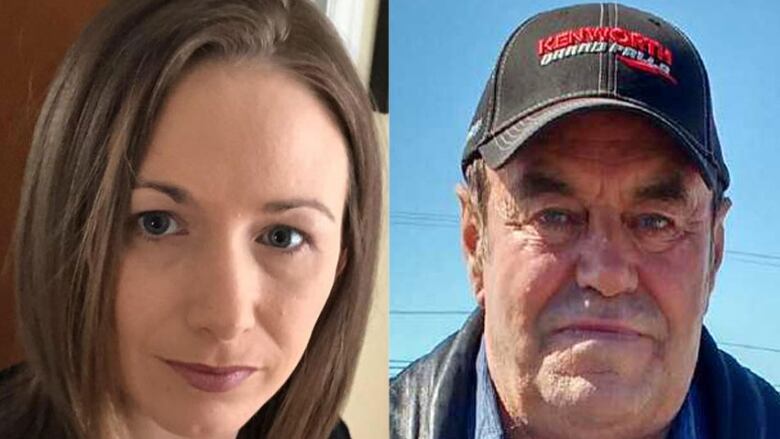
Two New Brunswickers who received life-saving transplants are sharing their views on Nova Scotia's plan to adopt presumed consent for organ donation.
Under the proposed system,any adult who does not opt out of donating their organs will be considered a potential donor.
Kristen Wheaton-Clayton, of Saint John, supports the switch from the current opt-in model.Donnie Ritchie, of Greenfield, doesn't.
Here are their stories:
Kristen Wheaton-Clayton, 35, liver transplant
At 23, Wheaton-Clayton couldn't get through the day without a nap.
She felt exhausted and sick all the time.But it happened so gradually, she didn't realize she was ill.
"It was just how I felt," she says. "I didn't know any different."
It was only when she started getting intermittent pains on her right side that she went to the doctor.
At first, she was diagnosed with gallstones, but her blood work told a different story. Her liver enzymes were "through the roof."
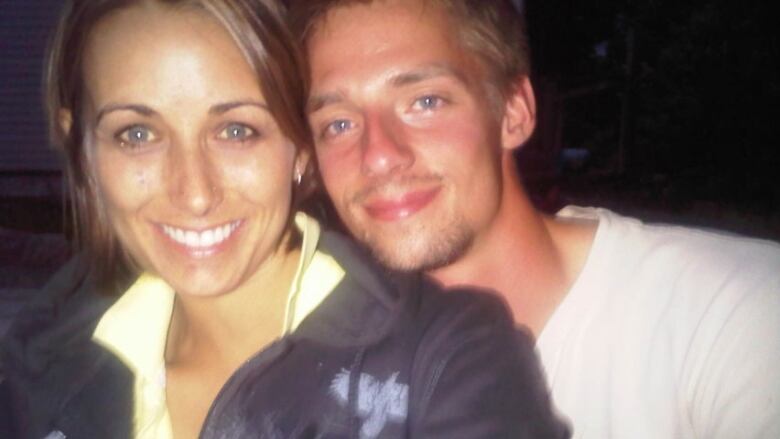
A scopedown her throat revealedcirrhosis of her liver. She was diagnosed with primary sclerosing cholangitis, or PSC, a progressiveliver disease.
"It was an absolute shock," she says. "I mean, I wokeup from surgery and they'retelling me that someday I neededto havea transplant. So I actuallywent into denial."
Two years later, there was no more denying it. Herskin and thewhites of her eyes turned yellow.
By the age of 26, she was on the transplant list. That's when she says she realized how serious her situation was.
"Because atransplant isn't guaranteed. There's many people that die on the waiting list every year because there's not enough organs."
More than150 NewBrunswickersare waiting for organs, including 128 waiting for either livers or kidneys.
As her condition deteriorated, Wheaton-Clayton had to quit her new job in the hospitality industry and move back in with her parents.
For the next year-and-a-half, she waited for the phone to ring with an update on a transplant.
She couldn't travel, in case the call came that a donor had been found, and she couldn't go anywhere out of cellphone range.
"You can't move forward in your lifeyou can't think about thefuture. You're just kind of surviving day to day."
Listen to Kristen Wheaton-Clayton explain why changes to organ donation rules are so important to her.
Wheaton-Clayton tried her best to stay positivebut admits it wasn't easy.
"I had days for sure where sometimes it would all hit methat this was it, I was never going to see 30."
She credits the strength and support of her family, friends and husband Jordan Clayton, whom she met shortly after being diagnosed with the disease.
A morning call
"He pushed me to do as much as I could and continue living," she says. "Nobody ever let me wallow in self-pity too much."
On July 13, 2011, around 8:30 a.m. Wheaton-Clayton had just stepped out of the shower when she got a series ofexcitedvoicemail messages from her mother Annette. A liver was available.
"She said, 'Get ready, we're going to Halifax.'"
The Queen Elizabeth II Health Sciences Centre in Halifax performsallliver, kidneyand heart transplants for patients across the Atlantic provinces.
'It hit methis could be it'
Wheaton-Clayton "didn't sleep a wink" that night and"started bawling"right before her 4 a.m. surgery.
"It hit methis could be it. Either I'm going to wake up and be all better or," she says, hervoice trailingoff.
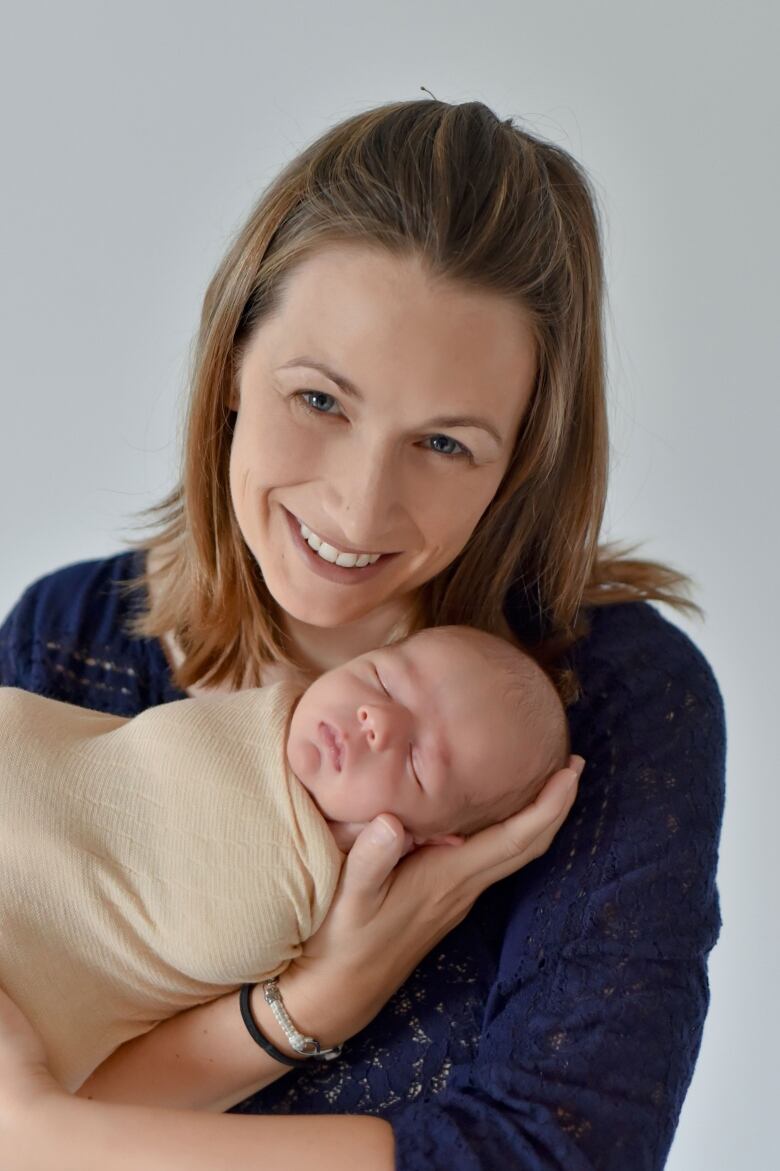
Shewoke up in intensive care and felt like a new person. She had energy, the jaundice was gone, and she had a newfound love of jelly beans and club sandwiches a mysteryshe attributes to her anonymous donor.
"I've always had a feeling it was a middle-aged man. I can't explain it."
She spent more than two weeks in hospital and another two months livingin Halifax being monitored by her health-care team.
On the one-year anniversary of her transplant, she sat by a lake and wrote a letter to the family of her donor.
"It was extremely, extremely hard to try andfind the words to say thank you and sorry for your loss."
Now 35 and the mother of a six-month-old boy, Wheaton-Clayton is an advocate for organ donation asvice-president of the Canadian Transplant Association.
She hopes to seeother provinces follow Nova Scotia's lead with presumed consent.
Has worked in other countries
She says statistics show the vast majority of Canadianssupport organ and tissue donation, but only a small percentage actually take the time to register as donors or express their wishes to their families.
Several other countries have provenpresumed consent can work, she says. Spain has been doing itsince 1979.
Wheaton-Claytonfindsthe comments ofnaysayers surprising and disheartening.
Forget about governmentand forget aboutpoliticsand realize that sometimes it's just about, you know, people and life.- Kristen Wheaton-Clayton,transplant recipient
People are six times more likely to needa transplant than they are to actually become a donor, she says, and increasing the number of potential donors increases the survival chances of those on waiting lists.
Wheaton-Clayton suspects misinformation might be behind many peoples' fears. For example, some people believe if they're hospitalized, doctors won't do everything possible to save their life if they're an organ donor, she says.
"That's completely not true."
'An amazing, amazing gift'
Some people have also argued the government is taking away their choice. But they still have a choice it's just that instead of a choice to say yes, it's a choice to say no,she says.
"It sobothers me that they can't look at someone like myself a young woman in her 20s who was told that she was going to die if she doesn'thave a liver transplant, and she somehow is one of thelucky ones, she does get it and then years later, I'm able to give life to this perfect little healthy boy because this person passed away that did not need their organs, and either theyor their family made this amazing, amazinggift to donate their organs.
"It gave methese extra years and him, life.I wish that that is what these people could see andforget about governmentand forget aboutpoliticsand realize that sometimes it's just about, you know, people and life."
DonnieRitchie, 67, double lung transplant
Ritchie, who lives about 30 kilometres north of Hartland, was always a self-professed "over-energetic person."
He loved being outdoors and working.Hislogging company was a perfect fit. He ran it for decades.

Then about five years ago, he noticed he was short of breath. Even small jobs left him winded and took much longer than before.
"I just could not breathe," recalls the former smoker, who had a pack-a-day habit for 40 years.
A specialistfound his lung capacity was only at 23 per cent.Ritchiewas diagnosed with chronic obstructive pulmonary disease, or COPD.
Before he knew it, he was on oxygen. He couldn't get his oxygen tank into the woods though, so he tried to work without it.
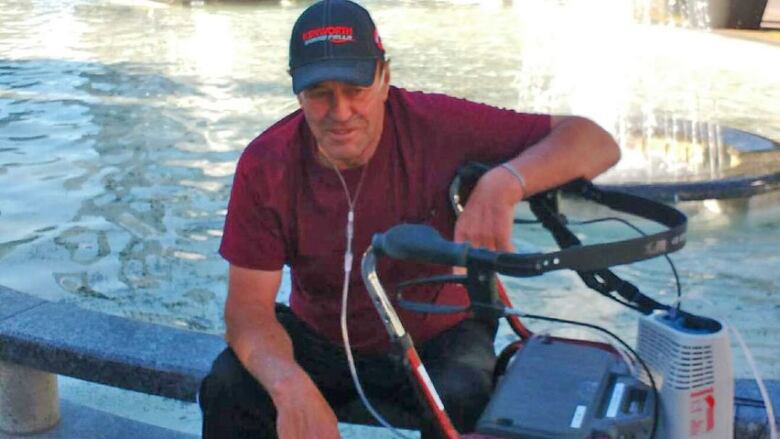
"It got so bad that when I went to get up on the loader, I'd only get three steps and I had to stop and get my wind," he says. "Sometimes you wouldwonder if I was coming back or not."
Ritchie had to stop working and give up his business.
"It was pure h-edouble hockey sticks," he says, to avoid the word hell.
His health continued to worsen and, too embarrassed to be seen, he became ashut-in, "sitting there, watching that stupid TV."
Life wasit really wasn't worth living.- Donnie Ritchie, transplant recipient
"Life wasit really wasn't worth living," says the married father of four.
His wife of 46 years, Doreen, felt helpless.
"It was hard to watch him go through that," she says.
"He had been so active. He was always outside doing something. Just busy, busy all the time loading wood, fixing machinery."
3 years to live at most
Without a transplant, Ritchie says, one doctor estimated he would survive only two or three years.
He got on the list for a double lung transplant last June and was a bit nervous. So he drove around the province, tracking down lung transplantrecipients to talk to, "just to see what was what."
"Every one of them told me, 'If you can get it, get it,'" he says. "They reassured me."
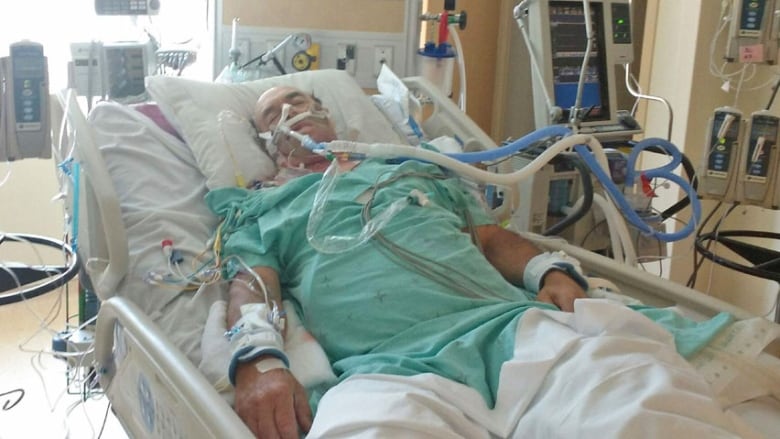
Ritchieand his wife, used to country living, had to find an apartment in Toronto close to the University Health Centre's lung transplant clinic and within a month, a donor was found.
He was shocked and ecstatic. "I was so happy, it was unreal," he says. "I plain lucked out."
'People's told to do enough now'
The surgery took 7 hours.
"You wake up and, oh my God, that first breath of air is unreal," says Ritchie.
He says he feels 20 years old again.
"It's a beautiful gift. You can't get any better gift than that."
But while he's a proponent of organ donation, he does not agree with presumed consent. He'd rather educate people so more chose to donate.
"People's told to do enough now, as far as I'm concerned," he says.
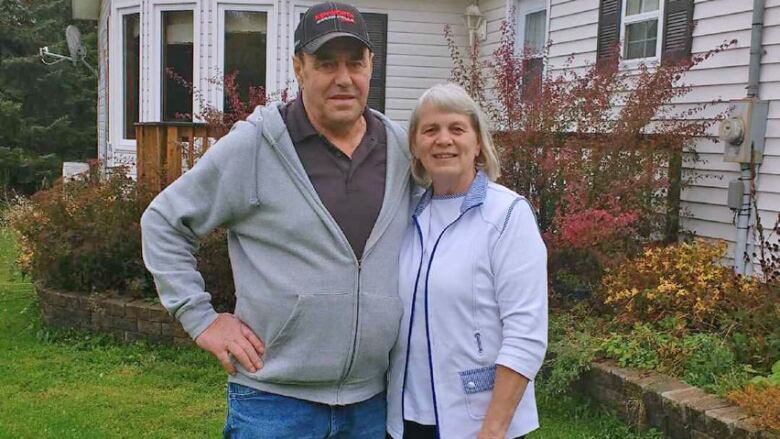
He alsoworries people might not realize they have to opt out or they might forget to do so.
Ritchiethinks education andraising awareness are the bestway to go and hopes sharing his story will help.
"Anything that I can possibly do to help people make up their minds to be on the list, Icertainly would," he says.
"I wouldn't be sitting here talking to you if somebody hadn't donated their lungs."
To help raise awareness about organ and tissue donation, fun run/walk events are being held across New Brunswick this month.
Transplant Trots are scheduled for Saint John and Moncton today, Fredericton on Sunday and Grand Manan on April 20.
With files from Information Morning Saint John












_(720p).jpg)


 OFFICIAL HD MUSIC VIDEO.jpg)
.jpg)



























































































